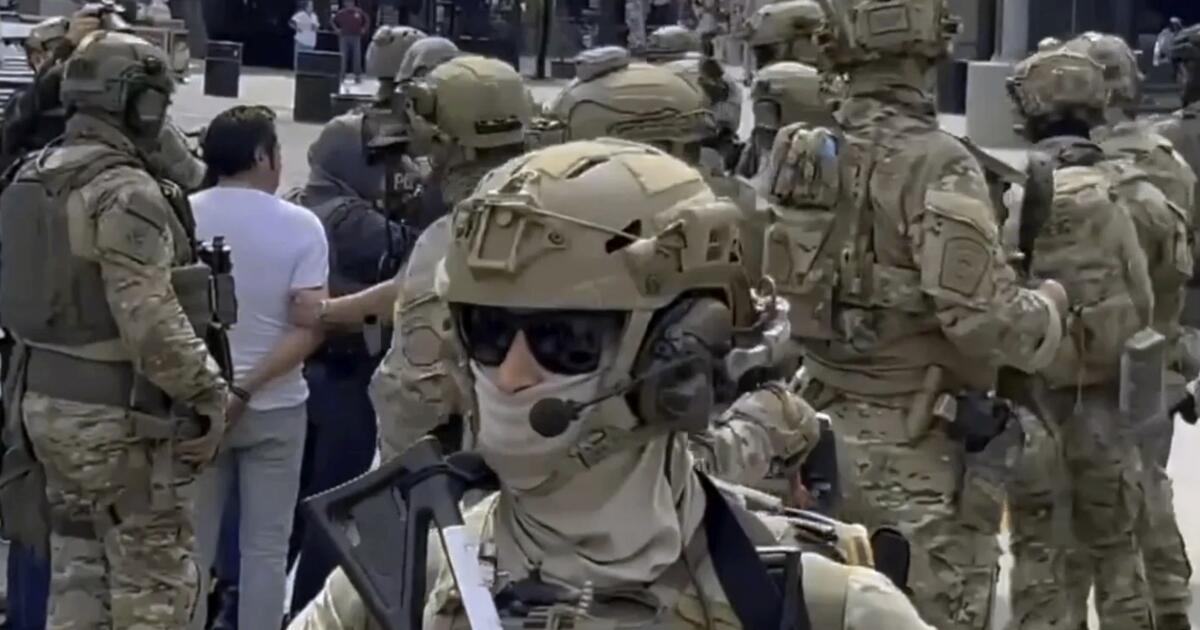Federal judge strikes down California mask ban on immigration agents
A federal judge on Monday struck down a new California law that banned federal immigration agents and other law enforcement officers from wearing masks in the state, but an effort already is underway to revive the statute.
U.S. District Judge Christina A. Snyder in Los Angeles ruled that the No Secret Police Act does not apply equally to all law enforcement officers because it excludes state law enforcement, and therefore “unlawfully discriminates against federal officers.”
But, Snyder said, the ban does not impede federal officers from performing their federal functions, indicating that a revised law that remedies that discrimination may be constitutional.
State Sen. Scott Wiener (D-San Francisco), the author of the legislation, on Monday proposed a new prohibition on mask-wearing by all law enforcement officers in California, a change he argued would bring the ban into compliance with Snyder’s ruling.
Wiener said he will immediately file his updated bill in order to unmask U.S. Immigration and Customs Enforcement and other federal agents conducting unconstitutional enforcement in the state as soon as possible.
“We will unmask these thugs and hold them accountable. Full stop,” Wiener said, calling Snyder’s ruling a “huge win.”
Atty. Gen. Pam Bondi, who sued California to block the law from taking effect, cast the ruling in starkly different terms, as a win for the federal government and immigration agents doing a difficult job under intense scrutiny.
“ANOTHER key court victory thanks to our outstanding [Justice Department] attorneys,” Bondi wrote on X.
“Following our arguments, a district court in California BLOCKED the enforcement of a law that would have banned federal agents from wearing masks to protect their identities,” Bondi wrote. “These federal agents are harassed, doxxed, obstructed, and attacked on a regular basis just for doing their jobs.”
Wiener helped push two new California laws last year — the No Secret Police Act and the No Vigilantes Act — in the wake of intense and aggressive immigration enforcement by masked ICE and other federal agents in California and around the country.
The No Secret Police Act banned local law enforcement officers, officers from other states and federal law enforcement personnel from wearing masks except in specific circumstances — such as in tactical, SWAT or undercover operations. It did not apply those restrictions on California’s state law enforcement officers.
The No Vigilantes Act required any law enforcement officer operating in California to visibly display identification, including the name of their agency and their name or badge number, except in undercover and other specific scenarios.
Gov. Gavin Newsom signed the measures into law in September, though the state agreed to not enforce the measures against federal agents in the state while the Justice Department’s challenge was heard in court.
In her ruling Monday, Snyder blocked only the ban on masking by federal agents, and on seemingly narrow grounds.
Snyder said that the court “finds that federal officers can perform their federal functions without wearing masks. However, because the No Secret Police Act, as presently enacted, does not apply equally to all law enforcement officers in the state, it unlawfully discriminates against federal officers.”
“Because such discrimination violates the Supremacy Clause, the Court is constrained to enjoin the facial covering prohibition,” she wrote.
Weiner said it was “hard to overstate how important this ruling is for our efforts to ensure full accountability for ICE and Border Patrol’s terror campaign.”
Wiener said he and colleagues had crafted the No Secret Police Act in consultation with constitutional law experts, but had “removed state police from the bill” based on conversations with Newsom’s office.
“Now that the Court has made clear that state officers must be included, I am immediately introducing new legislation to include state officers,” Wiener said. “I will do everything in my power to expedite passage of this adjustment to the No Secret Police Act.”
He said ICE and Customs and Border Protection officers were “covering their faces to maximize their terror campaign and to insulate themselves from accountability. We won’t let them get away with it.”
Wiener is also pushing new legislation — called the No Kings Act — that would allow people in California to sue federal agents for violating their rights. Democrats in Congress are also demanding that immigration agents stop wearing masks as a condition for extending Department of Homeland Security funding.
In response to Wiener’s suggestion that he had removed state officers from the bill based on conversations with the governor’s office, Newsom’s office posted on X that Wiener “rejected our proposed fixes to his bill” and “chose a different approach, and today the court found his approach unlawful.”
In a separate statement, Newsom hailed Snyder’s upholding the identification requirement for officers as “a clear win for the rule of law.”
“No badge and no name mean no accountability. California will keep standing up for civil rights and our democracy.”
Bondi said her office would continue defending federal agents from such state action.
“We will continue fighting and winning in court for President Trump’s law-and-order agenda — and we will ALWAYS have the backs of our great federal law enforcement officers,” she said.
